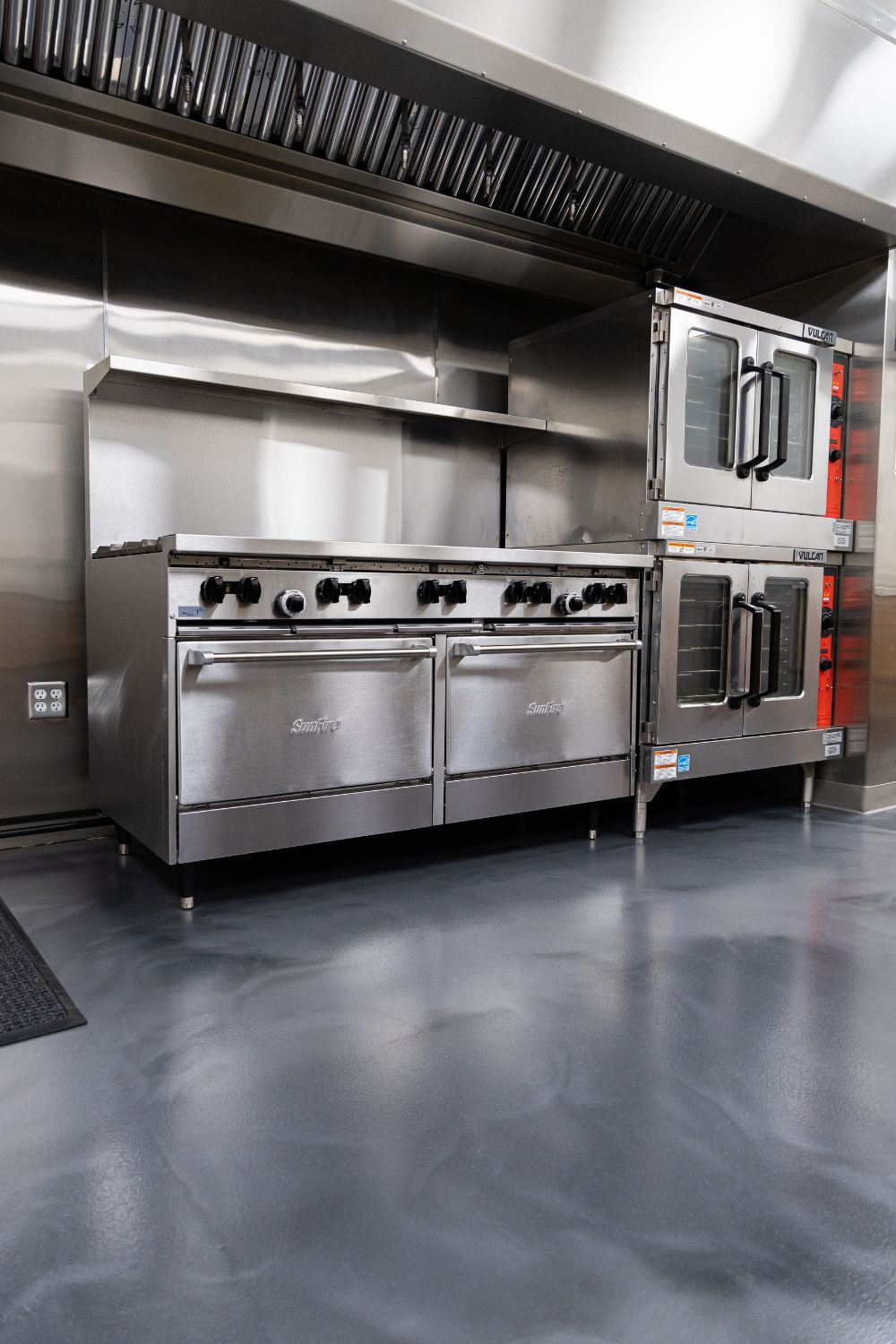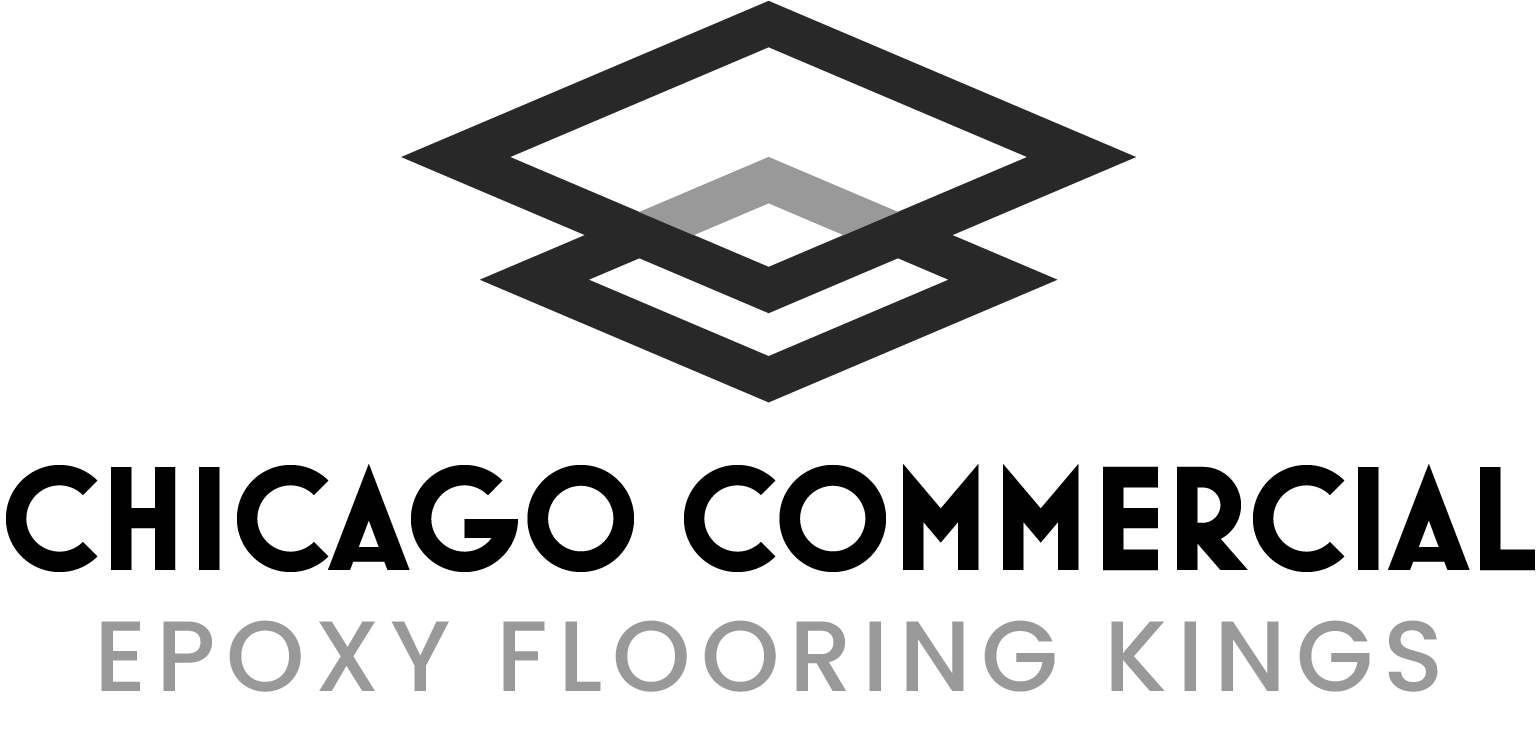Epoxy Flooring for Commercial Kitchens in Chicago, IL
Epoxy flooring for commercial kitchens in Chicago is essential for safety, durability, and hygiene. At Chicago Commercial Epoxy Flooring Kings, we specialize in commercial kitchen epoxy floor coatings and food-safe epoxy flooring that withstand heavy use, spills, and constant cleaning. Our non-slip epoxy floors for kitchens and heavy-duty epoxy flooring for restaurants provide a seamless, easy-to-maintain surface ideal for busy kitchen environments.
We handle everything from epoxy floor installation for commercial kitchens to seamless epoxy floors for food prep areas, delivering durable epoxy flooring for kitchens and industrial epoxy floors for kitchens designed to resist stains, slips, heat, and chemicals. Our hygienic epoxy flooring solutions help keep your workspace safe, efficient, and compliant with Chicago’s health and safety standards, giving you a floor that lasts and looks great over time.
Our Design and Customization Options
Color and Finish Choices
We provide a wide palette of colors for epoxy floors, including neutral tones like gray and beige, as well as bold colors like red and blue. These colors help create a professional look while meeting the kitchen’s lighting and visibility needs.
In addition to color, we offer multiple finish options. You can choose from matte, satin, or high-gloss surfaces. Each finish affects the floor’s appearance and how easy it is to clean. We help you pick the best finish to balance aesthetics and maintenance.
Slip-Resistant Textures
Safety is a top priority in commercial kitchens. We add slip-resistant textures to our epoxy flooring to reduce accident risks. Options include fine aggregates or larger grit materials mixed into the surface.
You can select the texture level based on your kitchen’s activity and foot traffic. This helps prevent slips without making the floor hard to clean. Our textured floors meet industry safety standards and improve worker confidence.
Branding and Aesthetic Integration
We can incorporate your company’s logo, colors, or other branding elements into the floor design. This not only boosts your kitchen’s visual appeal but supports brand identity.
Our team uses advanced techniques to embed images or patterns directly into the epoxy. This customization is durable and stays clear despite heavy wear. It helps your kitchen stand out and reinforces your business image.

Our Installation Process for Commercial Kitchen Epoxy Flooring
Site Assessment and Preparation
We begin by inspecting the kitchen floor’s condition. This includes checking for cracks, moisture, and cleanliness. Any damage must be repaired, and the surface cleaned thoroughly to ensure strong epoxy adhesion.
Next, we grind or shot blast the floor to remove old coatings or contaminants. This step creates a rough surface, which helps the epoxy bond tightly. Proper surface preparation reduces peeling and extends the floor’s lifespan.
We also check the moisture level in the concrete. High moisture can cause the epoxy to fail. If needed, moisture barriers are applied before the epoxy.
Step-by-Step Installation
First, we mix the epoxy resin and hardener in exact proportions. Consistency here is vital for proper curing and strength.
Then, we apply a primer coat to seal pores and improve adhesion. After the primer dries, we spread the base epoxy coats evenly with rollers or squeegees.
In kitchens, we often add anti-slip aggregates to the final coat for safety. We control thickness carefully to meet durability requirements, usually around 2-3 mm total.
Curing Time and Return to Service
After application, the epoxy must cure fully. This process usually takes 24 to 72 hours, depending on temperature and humidity.
During curing, the floor should be kept free of traffic, moisture, and dust. We monitor conditions to avoid problems like bubbling or soft spots.
Once cured, the floor is ready for heavy kitchen use. Proper timing ensures the floor withstands grease, heat, and constant foot traffic without damage.
Health, Safety, and Compliance Standards We Follow
Non-Slip and Hygiene Advantages
Our epoxy flooring includes textured finishes that reduce slip risks, even when floors are wet or greasy. This is crucial in commercial kitchens where spills are common. The seamless surface prevents dirt, oils, and bacteria from getting trapped in cracks or joints. This makes cleaning easier and helps keep the kitchen hygienic.
Epoxy coatings are resistant to chemicals and stains, so harsh cleaners won’t damage the floor. This durability means the floor stays safe and clean for longer periods.
Meeting Chicago and Illinois Regulations
We ensure our epoxy floors meet all local and state standards for commercial kitchens in Chicago and Illinois. This includes slip resistance, fire safety, and proper drainage.
Our installations comply with OSHA guidelines that focus on worker safety. Floors meet the minimum coefficient of friction to prevent accidents. We also consider Illinois Department of Public Health regulations for food service areas. Our floors support inspections by providing clean, safe, and easy-to-maintain surfaces.
Maintaining Food Safety Protocols
Epoxy floors help kitchens maintain strict food safety by reducing contamination risks. The non-porous surface does not absorb liquids, which stops bacteria growth. We install floors that are easy to clean and sanitize frequently. This supports HACCP practices by allowing thorough daily floor maintenance without damage.
Our flooring systems resist mold and mildew buildup. This is essential for kitchens aiming to meet FDA and local food safety rules during inspections.
Epoxy Flooring for Commercial Kitchens FAQs
What are the advantages of epoxy flooring for commercial kitchens?
Epoxy flooring is strong and lasts a long time under heavy use. It resists stains, chemicals, and water, making it good for food prep areas.
It also looks clean and smooth, which helps keep the kitchen hygienic. The seamless surface reduces places for dirt and bacteria to hide.
How long does a commercial kitchen epoxy floor installation take?
Installation usually takes 2 to 4 days. This depends on the size of the kitchen and how much prep work is needed.
After applying epoxy, it needs about 24 hours to cure before use. We plan the timing to limit disruption to your kitchen operations.
Are epoxy floors in commercial kitchens slip-resistant?
Yes, we add a slip-resistant texture to the epoxy surface. This helps prevent accidents from spills or grease.
The level of slip resistance can be adjusted based on your kitchen’s needs and safety standards.
What maintenance is required for epoxy kitchen floors in a commercial setting?
Cleaning epoxy floors is simple. Regular sweeping and mopping with mild detergents keep the surface safe and bright. Avoid harsh chemicals or abrasive tools, as they can damage the epoxy. Inspections help spot any repairs needed early.
How does epoxy flooring in commercial kitchens compare cost-wise to other flooring options?
Epoxy floors typically cost less than tile or stone but offer similar durability. Installation is faster, which can lower labor expenses. Over time, lower maintenance and repair costs make epoxy a cost-effective choice for many kitchens.
